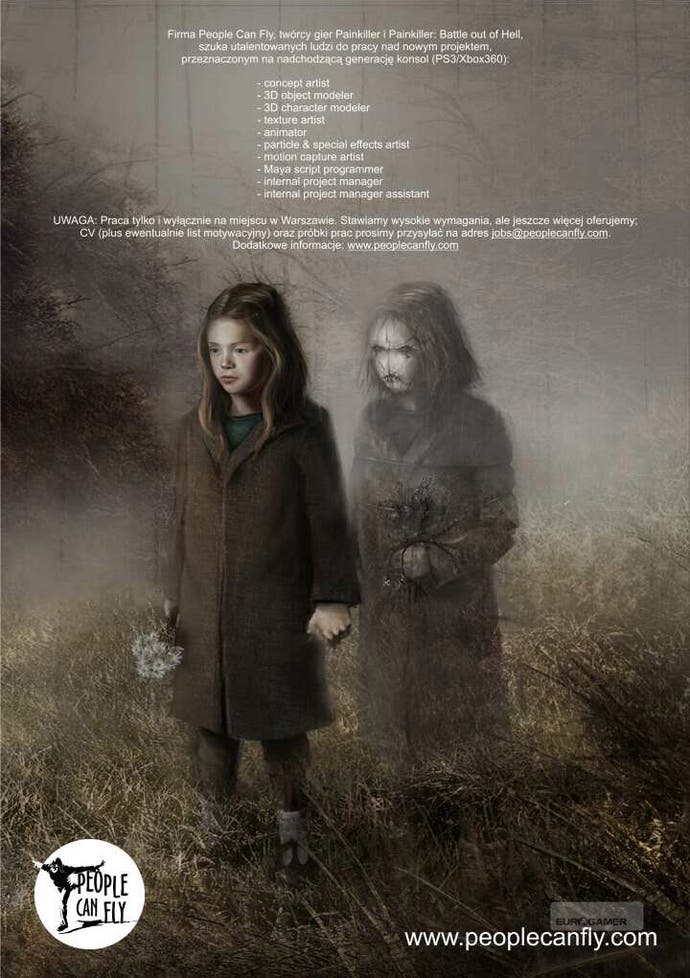Why THQ canned Bulletstorm dev's LA Noire-like game, Come Midnight
A "moody as f***" 1940s supernatural detective thriller.
Before Bulletstorm, Polish studio People Can Fly spent a year making a very different game: a "moody as f***" detective thriller with a supernatural edge - Come Midnight. It was a PS3 and 360 game due, approximately, in 2007, and former People Can Fly leader Adrian Chmielarz believes "[it] would have been absolutely incredible".
But Come Midnight would never be, because in 2006 publisher THQ unceremoniously pulled the plug. In a sunny Polish courtyard in Krakow, attending the Digital Dragons conference, I asked Chmielarz to tell me more.
"The problem with the game was that it was very hard to explain," he said, "in a way that it mixed noire, survival-horror, adventure, thriller, love story... The closest I can give you would be a more streamlined LA Noire - LA Noire meets Uncharted, in a way.
"You are a private eye and you start a normal investigation, but it turns out that there are some otherworldly powers at work, and you can communicate with the dead."
The detective you play had briefly died at one point - seen The Tunnel, seen the beyond. "And when he got back he actually kept that ability to see into the afterlife," Chmielarz explained. The detective could see the last 30 seconds of a corpse's life just by touching them.
"It was moody as f***," Chmielarz added, "an incredibly moody game. Great narration, third-person perspective like Resident Evil mixed with LA Noire, and full of surprises."
In terms of game mechanics, everything was thrown in, and it was powered by a bespoke game engine. "There were shooty bits, you were fist-fighting, you were visiting shady places talking to people." But it all centred around the core idea of "what it would be like to be a supernatural detective in the '40s".
"I don't want to spoil the concept about what it was really about," he went on, "because the concept was also really cool, and a lot of people at PCF really regretted it when THQ cancelled it because it was something really different. But that was the problem: it was different."
"THQ seriously f***ed us over at this point"
Adrian Chmielarz

It was cancelled for "reasons outside of the game itself". Chmielarz has it on paper that it wasn't People Can Fly's fault, it was THQ's. "THQ was reorganising, withdrawing from Europe," he said. "They were supposed to leave just one title and S.T.A.L.K.E.R. was way more advanced at this point - close to release - and we were one-third in.
"THQ seriously f***ed us over at this point," he added. "They just cancelled. 'OK we're just cancelling the game - see ya.' It's all corporate bulls***; three weeks before, they cancelled all communication - no phone calls, stopped answering emails. Absolute a**holes."
People Can Fly - then an independent developer - found itself in a precarious financial position, "left with just a little bit in the bank". "So we went after Unreal," Chmielarz said. The hope was to recapture some of its Painkiller success quickly, using a ready-made engine.
A month-and-a-half later PCF had a prototype and showed it to Epic Games wanting a second opinion. Was it good enough to show to publishers? "And they said 'yes, it's good enough that you actually shouldn't talk to publishers - bring it to us!'" And out of that relationship came Bulletstorm and a full acquisition of the studio. Chmielarz tried to push Come Midnight again, he said, but it was still deemed "too different".
He told me he's trying to find out who has the rights to Come Midnight now, "because it's not THQ". He'd like to write a blog post about it, he said. He's also not entirely against reviving the game, hence his reluctance to spoil the bigger, juicier ideas.
But for the time being he has his hands busy building The Vanishing of Ethan Carter, a non-combat, weird fiction horror game for PC due out this summer - built at his new independent studio The Astronauts. I've seen the game in action and will have a preview written soon. Suffice to say that Come Midnight didn't entirely die with THQ.


